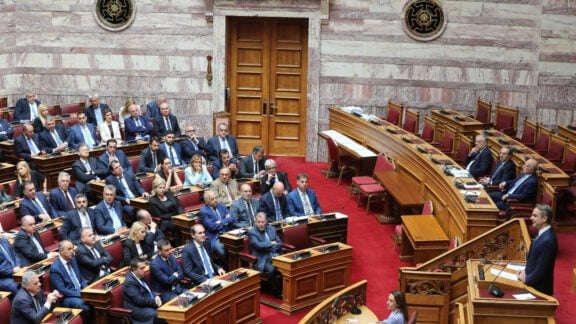Ages are often defined by the media and technologies available. We now live in a world as a virtual café, where, however, the “sidebar chats” off-screen and offline may not be picked up during communication.
Such a situation presents both opportunities and implications. Amid a major communications shift, the Greek state-Greek Diaspora model seems to be stuck in a time warp from the latter part of the twentieth century, say, for convenience’s sake, in 1975.
I use this date for several reasons; it is the midpoint for the latter part of the twentieth century, and, significantly, in the summer of 1974, the Junta Dictatorship fell in Greece, ushering in democracy to the country and that has continued, despite all its failings, for fifty years.
Greek Diaspora in the twentieth century
The Greek Diaspora, whether in the Anglophone immigrant societies of the United States, Canada, and Australia and especially in the “Gastarbeiter” or guestworker societies of Western Europe – primarily Germany – consisted of Greeks who were often one generation removed from their homeland. For nearly the past century, several hundred thousand Greeks quit the Greek Kingdom and Greek-inhabited parts of the Ottoman Empire on a mass scale, in contrast to older, episodic, often commercially oriented migration of Greeks to Russia, Central Europe, and other Mediterranean destinations, most notably Egypt.
This mass migration took some rules from the playbooks of earlier waves and set up mass membership lodges, such as AHEPA and GAPA, organisations based on topical origin (Syllogoi). Of course, Greek Orthodox Churches, often enough locally financed, eventually fell under the Ecumenical Patriarchate.
The demographics were favourable, bolstered by continued immigration in several waves, and there was a substantial degree of endogamy within the Greek émigré community even as they actively assumed a hyphenated yet full-on identity as Americans, Canadians, and Australians. The lack of cheap, convenient communication technologies kept the communities often separate from Greece and each other, though the global network of the largest merchant marine in the world functioned as its network, often supplying its trickle of immigrants, like my father.
During World War II, particularly in the US, Greek Americans were all in, proud of the heroism of their ancestral homeland and ardent patriots for their country, the United States. AHEPA was the largest single institutional buyer of US War Bonds, and the bigotry of past decades faded as Greek Americans actively partook of the American Dream. At the same time, more Greeks came over, and an even larger wave hit the shores of Australia and Canada, recreating, in ethos if not in scale, the (Greek) American Dream.
By the 1970s and 1980s, Greek Americans were probably at their demographic and socioeconomic acme. They ranked second to Jewish Americans in income and first in educational attainment. I recall interning in Congress in the late 1980s for Senator Paul Sarbanes, the first Greek American US Senator. I met his Republican colleague, Olympia Snowe, also Greek, along with a good half dozen members of Congress, about equally divided between parties.
The “Greek Lobby” of the post-Cyprus invasion, which was a coalition of citizens, Congressional staff, and members of Congress, had started to fade into memory (if not mythology, note mythology), nonetheless had a demographic and economic punch, along with a Greek American nominee for the White House.
This approach was supported by vibrant churches full of ethnic Greeks, led by a true ethnarch, Archbishop Iakovos, who was also an American Civil Rights hero. A sense of engagement, assisted by the Greek Orthodox Church, a legacy of recent emigres, and increasing repatriation or visits to Greece, made the engagement between Greece and the Diaspora more intimate.
Greek Diaspora in the late twentieth century
At the same time, integration proceeded apace. Intermarriage and conversions changed the priorities of the parishes, and the church itself lost the sense of the centre of gravity it had for the Diaspora throughout its history. Attrition reduced the syllogoi and many parishes, as did the changing demographics of America and where (Greek)-Americans lived.
At the same time, a portion of Greek America became more integrated with Greece, often repatriating or maintaining dual citizenship or a home there (your correspondent has done all three). In contrast, Greek American institutions became increasingly hollow or co-opted by individuals who claimed that these organisations were up to the strength and vibrancy of the past—none of them are, and that includes, sadly, the Greek Orthodox Church.
This is the era we are in today, at least in the Anglosphere (US, Canada, Australia). Britain ( the mother of the Anglosphere) and the rest of Europe are, to some extent, different cases, as most of these countries are not countries of immigration but more countries of “Gastarbeiter.”
In the US, Greeks often maintain closer ties with Greece, and in the European Union, they have all of the rights of labour and settlement throughout Europe (minus Britain). Still, in this case, intermarriage also plays its role. Further, the hundreds of thousands of young Greeks who left during the Greek crisis are less likely to be endogamous, and though a foot may be in Greece, often as not, both feet become rooted in the new country.
We face a different world, yet the Greek government seems stuck in the mid-twentieth century when dealing with the Diaspora. Greek organisations often follow the same model, either on autopilot or deliberately, to maintain control of organisations with past prestige and (often enough) significant present assets (fixed or financial).
This organisational focus, whether to the so-called (and often self-appointed) advocacy groups, particularly those of Washington DC or focused there, or groups and lodges, or even the Greek Orthodox Church, may not be the right way to engage the Diaspora. Often, the Greek state prefers such organisations because they tend to be pliant toward the Greek government rather than pushing back when interests differ. That is not a formula for good interaction. It disintermediates good, dynamic actors and fosters a calcified complacency in the Greek government and these organisations.
At the same time, given the ease of communications, cheap travel and increasingly hybridised work and lifestyles, more and more diaspora Greeks have a real-time in the country, whether as repatriates or by owning property or investments.
Contemporary perspectives and future directions
In an information-based era, with an educated population and Diaspora, the opportunities for real cellular interaction between homeland and Diaspora are as endless as they are individual. This is occurring despite the Greek government and Greek organisations all too often claiming to speak for the Diaspora.
Time to put this into overdrive, and I suggest a couple of simple steps. First, the Diaspora must talk to each other, not via Greece. The Greek commercial diasporas of old, those in on the founding of Greece and the Greek merchant marine, worked with each other and assisted the Greek state from a position of strength as emotionally invested parties but not necessarily succumbing to emotional blackmail. Greece as a hub is fine, but the spokes must speak to each other, particularly those of us in Anglophone “New World” democracies fully invested in some of the world’s most diverse, innovative, and dynamic economies.
Second, Greek consulates must become citizen-friendly places where documents and initiatives are expedited, not where they “go to die.” In my studies of the early Greek commercial diasporas of the 1860s in the United States, consuls were often successful merchants who knew how to get things done. I am not saying to go back to such a system. Yet, currently, most consulates are not designed with a citizen focus, because there is a network of lawyers around them who have made a living in all the consular cities handling cases that might indeed be simple open-and-shut cases.
Consulates might also start learning about and focusing on citizens within their service area. I am a Greek national and an academic in one of the American South’s most prominent universities, yet I have never been contacted by the Atlanta consulate, though no doubt the heads of large Greek American organisations and Church donors probably have, even though they are unlikely to be Greek nationals.
Alexander Billinis is a Greek-American historian with a special interest in Greek maritime history, a university lecturer, and lawyer.









